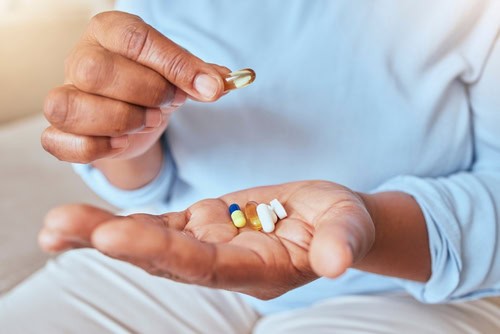 Medically reviewed by Dr. Matthew Fainman Virtual Care Medical Director at NextCare. Dr Fainman is an experienced Internal Medicine specialist, who earned his Bachelor’s, MBA, and Medical Doctorate from the University of Manitoba. He completed his residency at Cleveland Clinic and, with over 20 years in healthcare, is a leader in Telehealth innovation and patient care.
Medically reviewed by Dr. Matthew Fainman Virtual Care Medical Director at NextCare. Dr Fainman is an experienced Internal Medicine specialist, who earned his Bachelor’s, MBA, and Medical Doctorate from the University of Manitoba. He completed his residency at Cleveland Clinic and, with over 20 years in healthcare, is a leader in Telehealth innovation and patient care. Migraines are more than just a bad headache; they are a neurological condition that brings intense, throbbing pain, often accompanied by nausea, vomiting, and sensitivity to light and sound. Finding relief can be challenging, especially when symptoms persist for days.
When over-the-counter (OTC) options fail, a migraine cocktail—a combination of medications—might provide relief. These medical treatments, often administered in urgent care settings, target multiple migraine symptoms at once.
Understanding Migraine Cocktail Ingredients
A “migraine cocktail” isn’t a single, standardized prescription. Doctors and facilities will likely have different mixtures of the medicines. The specific medications used depend on a person’s medical history, allergies, and other health conditions.
Migraine cocktails typically contain a mix of medications that address different migraine symptoms. Each ingredient acts as a tool, working together to alleviate pain and associated symptoms.
Common Migraine Cocktail Ingredients
Here are some medications a doctor or medical provider might use:
⊕ Triptans: These medications have anti-inflammatory effects. It is believed that migraines affect more than 12% of U.S. adults. Triptans help narrow blood vessels in the brain, reducing swelling and pain. Some common triptans include sumatriptan, rizatriptan, and eletriptan.
⊕ Antiemetics: Medications like metoclopramide and prochlorperazine help reduce nausea and vomiting. They also have some pain-relieving properties.
⊕ Ergot Alkaloids: These work similarly to triptans, targeting blood vessels to relieve pain. Dihydroergotamine is an example often used in migraine cocktails.
⊕ NSAIDs: Nonsteroidal anti-inflammatory drugs, such as ketorolac, are common pain relievers. These nonsteroidal anti-inflammatory drugs combat swelling and reduce pain signals.
⊕ IV Steroids: IV steroids, like dexamethasone, reduce inflammation and pain. They’re particularly helpful for prolonged migraine attacks. Research suggests dexamethasone can help.
⊕ IV Fluids: IV fluids provide hydration, which can be beneficial during a migraine. While not everyone experiences nausea with migraines, some medications can cause it, making IV fluids helpful.
⊕ IV Magnesium: Magnesium plays a vital role in overall health. It can potentially prevent migraines from escalating.
⊕ IV Valproic Acid: Primarily used for seizure disorders. Valproic acid is sometimes included in migraine cocktails.
NextCare Urgent Care offers migraine treatments, including medications that target pain, nausea, and inflammation.
Delivery Methods for Migraine Relief
The medications mentioned are typically administered in a medical setting, such as an emergency room or urgent care center. These are for individuals experiencing severe, prolonged migraine attacks. These situations often involve failed at-home treatments.
These medicines can be administered in several ways:
⊕ Intravenous (IV) Infusion: A common method is through an IV, delivering the medication directly into the bloodstream. This allows for rapid absorption and relief. Patients may need to stay for 60 minutes or more after administration.
⊕ Injections: Some medications, like sumatriptan, can be injected. This offers quick relief by delivering the medication directly into the muscle.
⊕ Oral Medications: Some urgent care centers may use oral medications if IV services aren’t available. While less common, some individuals find relief through this method when other treatments have failed.
Side Effects of Migraine Cocktail Ingredients
Like all medications, those used in migraine cocktails can have potential side effects. The specific side effects vary depending on the medications administered and individual factors such as allergies, tolerance, and existing medical conditions.
It’s important to be aware of potential side effects before receiving treatment:
Possible side effects
| Medication | Potential Side Effects |
|---|---|
| Triptans | Tiredness, body pain, chest/neck tightness |
| Neuroleptics/Antiemetics | Muscle tics, tremors, or restlessness |
| Ergot Alkaloids | Sleepiness, stomach upset, nausea |
| NSAIDs | Stomach issues, diarrhea, belly pain |
| Steroids | Restlessness, dizziness, trouble sleeping |
Severe reactions are uncommon. If side effects occur, NextCare providers can adjust treatment for safer, effective relief.
Over-the-Counter Options
Sometimes, over-the-counter options can be helpful. These often include aspirin, acetaminophen, and caffeine. These are most relevant if you lack prescription options or other at-home remedies have failed.
These OTC migraine cocktails typically include:
⊕ Aspirin (250mg): A common pain reliever with anti-inflammatory properties.
⊕ Acetaminophen (250mg): Known for reducing pain and fever.
⊕ Caffeine (65mg): Helps constrict blood vessels to reduce blood flow and alleviate pain.
Are OTC Migraine Cocktails Effective?
A 2005 study examined the combined use of aspirin, acetaminophen, and caffeine. The results showed significantly greater relief from migraine symptoms compared to each medication taken individually. Products like Excedrin are well-known OTC migraine medications.
Doctors often advise against options containing caffeine due to potential restlessness. Doctors recommend Ibuprofen or naproxen as more suitable pain relief options for most migraine sufferers. Discuss your situation with a medical expert to make informed decisions.
Who Shouldn’t Use OTC Migraine Cocktails
Not everyone can safely use OTC migraine cocktails. Consult your healthcare provider if you:
⊕ Are allergic to aspirin, acetaminophen, or caffeine.
⊕ Take medications containing acetaminophen.
⊕ Are under 12 years old.
⊕ Experience a severe or unusual migraine compared to previous episodes.
⊕ Are pregnant or breastfeeding.
⊕ Have other health concerns.
Alternative Migraine Treatments
Many options exist for finding relief from migraine pain. Finding the right approach may involve trying different strategies or making lifestyle adjustments.
Medications: Beyond the Migraine Cocktail
⊕ OTC Pain Relievers: Common pain medications like ibuprofen, naproxen, or acetaminophen may relieve mild migraine symptoms.
⊕ Triptans: Sumatriptan, rizatriptan, and almotriptan target inflammation in blood vessels.
⊕ Ergot Alkaloids: These act as blood vessel constrictors to provide relief, similar to triptans.
⊕ Gepants: Often used for acute pain, ubrogepant and rimegepant might be prescribed if triptans aren’t suitable.
⊕ Ditans: Lasmiditan may be considered if triptans are not an option.
Preventative Medication Options
Certain medications can help prevent migraine attacks:
⊕ Blood Pressure Medications: Beta-blockers and calcium channel blockers may help prevent symptoms.
⊕ Antidepressants: Medications like amitriptyline can correct imbalances that trigger migraines.
⊕ Antiseizure Medications: Valproate and topiramate help regulate chemical levels linked to migraine symptoms.
⊕ CGRP Inhibitors: Erenumab or fremanezumab target a protein involved in migraine headaches.
⊕ Botox: Botox injections prevent nerves from transmitting pain signals.
Beyond Medication
Several lifestyle strategies, beyond prescription and OTC medications, can be integrated into daily life. The most effective migraine treatment options vary depending on individual migraine triggers. Consider the following:
⊕ Relaxation: Managing stress is crucial. Explore techniques like deep breathing, mindfulness, or yoga. Lowering your stress levels is very important.
⊕ Exercise: Regular physical activity can help maintain a healthy balance in the body.
⊕ Vitamins and Minerals: Studies suggest a link between low levels of magnesium, vitamin B2, or CoQ10 and migraines.
⊕ Acupuncture: While more research is needed, preliminary data on acupuncture for migraine relief is promising.
There are many potential avenues to explore when seeking relief from migraine headaches. Finding the right approach for your specific needs and symptoms is important. This should be done through open communication with a trusted physician.
Final Thoughts: Get Relief Today
Managing migraines can be challenging and often requires a multifaceted approach. When at-home remedies are insufficient, exploring other treatment options and understanding potential migraine cocktail ingredients empowers individuals to take appropriate action. It is important to find a way to reduce pain.
For those experiencing persistent or severe migraines, NextCare Urgent Care offers fast, effective migraine treatment. Our providers can assess your condition, provide immediate relief, and help develop a long-term plan to reduce migraine frequency and severity.
FAQs: Migraine Cocktail Ingredients and Treatment
Yes, NextCare Urgent Care offers migraine treatment to help manage severe symptoms without a long wait. Find an urgent care clinic near you.
A migraine cocktail is a combination of medications designed to relieve migraine pain, nausea, and other symptoms. At NextCare Urgent Care, migraine treatment may include:
⊕ Pain relievers (NSAIDs like ketorolac)
⊕ Antiemetics (to reduce nausea)
⊕ IV fluids (for hydration)
⊕ Steroids or magnesium (for inflammation relief)
Migraine cocktails typically work within 30–60 minutes, depending on the severity of symptoms and the medications used.
For mild migraines, a combination of aspirin, acetaminophen, and caffeine (found in Excedrin) can provide relief. However, if pain persists, urgent care treatment may be necessary.
Seek urgent care if:
⊕ Migraine symptoms last longer than 72 hours
⊕ Pain is severe and not responding to OTC treatments
⊕ You experience nausea, vomiting, or dehydration
⊕ Migraine is accompanied by neurological symptoms (confusion, vision changes, weakness, numbness)
Yes! IV fluids can provide rapid hydration and may help ease migraine symptoms.
Yes! Our providers assess migraine triggers, recommend treatments, and suggest preventative strategies to help you manage chronic migraines more effectively.
A common OTC migraine cocktail includes aspirin (250mg), acetaminophen (250mg), and caffeine (65mg), found in Excedrin Migraine. Always follow dosage instructions and avoid overuse, as it can lead to rebound headaches. If symptoms persist, seek urgent care.
Yes, some ingredients in a migraine cocktail—such as antihistamines, antiemetics, or magnesium—can cause drowsiness. If you experience extreme fatigue, consult a healthcare provider for alternative treatment options.
If a migraine cocktail doesn’t provide relief, your migraine may be resistant to standard treatments. NextCare Urgent Care can assess symptoms and recommend alternative treatments, such as IV fluids, steroids, or additional medications.
Overuse of migraine medications can lead to rebound headaches. OTC migraine cocktails should not be taken more than 10 days per month. If migraines persist, seek professional care.
If a migraine cocktail already contains NSAIDs (ibuprofen, aspirin) or acetaminophen, wait at least 6 hours before taking Excedrin to avoid overmedication and potential side effects.
If relief is temporary, your migraine may require a different approach. NextCare Urgent Care can evaluate your symptoms and provide alternative treatments, including preventive strategies and prescription medications.
Yes, when administered under medical supervision, a migraine cocktail is safe and effective for relieving severe migraine symptoms. However, certain medications, such as triptans and NSAIDs, may not be suitable for individuals with heart disease, high blood pressure, or gastrointestinal issues. If you have concerns, consult a provider at NextCare Urgent Care before treatment.
A prescription migraine cocktail may not contain caffeine, but OTC migraine cocktails (such as Excedrin Migraine) often contain 65 mg of caffeine per dose. Caffeine can help enhance pain relief by improving medication absorption and constricting blood vessels that contribute to migraine pain.
Migraine cocktails are administered by healthcare professionals, including urgent care providers, nurse practitioners, and physician assistants. At NextCare Urgent Care, our medical staff assesses symptoms and provides safe, fast-acting migraine treatment to help you find relief.
